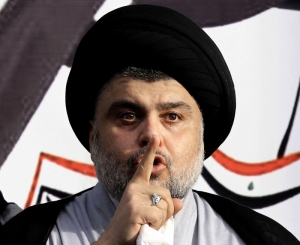Al-Sadr wants to lure the leaders of the framework into an embarrassing public debate
 BAGHDAD – The leader of the Sadrist movement, Muqtada al-Sadr, does not stop diversifying forms of pressure on his opponents within the pro-Iranian coordination framework, this time by luring them into an embarrassing public debate under the auspices of the United Nations.
BAGHDAD – The leader of the Sadrist movement, Muqtada al-Sadr, does not stop diversifying forms of pressure on his opponents within the pro-Iranian coordination framework, this time by luring them into an embarrassing public debate under the auspices of the United Nations.
Iraqi political circles said that al-Sadr’s goal by presenting the idea of a public debate is to confuse the leaders of the coordination framework, especially the leader of the State of Law coalition, Nuri al-Maliki, who fears that al-Sadr will open files of corruption, squandering public money, the fate of reconstruction funds, the conditions of defeat against ISIS and other files. The critical period witnessed by al-Maliki’s presidency of the government (2006-2014).
Iraqi circles believe that the victims of the disclosure, which al-Sadr wants to be public, will not only be al-Maliki, as the list may expand to include Hadi al-Amiri, leader of the Badr militia, and Qais al-Khazali, leader of the “Asa’ib Ahl al-Haq” militia, which will give Iraqis the opportunity to learn the details of the militia’s rule, the influence of the Popular Mobilization and methods of financing it. overt and confidential.
Al-Maliki fears that Al-Sadr will open files of corruption during his presidency, and Al-Amiri and Al-Khazali will expose the rule of the militias
These circles believe that al-Sadr’s goal in adhering to public dialogue and rejecting any secret dialogue is to drag his opponents to confront the Iraqi street, confirm their accusations of corruption and dependence on the outside, and explain the reasons why he refuses to just sit with them as well as allying with them in Parliament or the government.
Al-Sadr announced, on Saturday, that he did not find a response to a proposal he submitted to the United Nations regarding holding a public dialogue session with the political parties in the country to resolve the crisis.
Al-Sadr said in a statement posted on his Twitter page, “We submitted a proposal to the United Nations for a dialogue session, but rather a public debate and a live broadcast, with all political parties, but we did not see a tangible response from them.”
He added, “The answer was through the mediator, and it did not include anything about reform, the demands of the revolutionaries, or what the people are suffering from, and they did not give what is happening any importance at all.” Al-Sadr added, “I will not sit with the corrupt.”
He continued, “We ask everyone to wait for our other steps regarding the policy of ignoring what has become of Iraq and its people because of corruption and dependency.”
On Thursday, the Sadrist movement announced its rejection of the results of a meeting of the national dialogue held on Wednesday, saying that it “does not get fat and does not sing from hunger,” and accused most of the attendees of seeking to “stay in the chair.”
The Sadrist movement was absent from this session called by Prime Minister Mustafa Al-Kazemi and attended by leaders of political forces to search for a solution to a political crisis that has been going on for more than ten months, which prevented the formation of a new government.
The meeting came out with five points, most notably: calling on the Sadrist movement to engage in dialogue to set mechanisms for a comprehensive solution, agreeing to continue dialogue to lay down a legal and constitutional road map to address the current crisis, and stopping all forms of field, media or political escalation.
On Friday, a preacher close to al-Sadr attacked the results of this meeting, describing them as “worthless and we do not value them.”
Al-Khatib Muhannad al-Moussawi told thousands of al-Sadr’s followers during the Friday prayer sermon at their sit-in in front of the parliament headquarters, “The political dialogues that you hold are not for the benefit of the people or the country, but are for your survival and have no value and we do not value them.” He added, “The Iraqi people are the ones who decide their fate, and they are the source of the authorities, and the people’s exit today is against corruption and those who do not respect the people and the state, not against the state.”
In addition to the leaders of the political forces and Al-Kazemi, the Iraqi President Barham Salih, Parliament Speaker Muhammad Al-Halbousi and the Supreme Judiciary, Baiq Zaidan, participated in the dialogue meeting, in the presence of the United Nations envoy to Iraq, Jenin Plaskharat.
Parallel to a mutual escalation between the coordination framework and the Sadrist movement, calls are intensifying from local political leaders and many countries for calm and dialogue between the parties as the only way to resolve the crisis, as local, regional and international forces fear Iraq’s slide into chaos.
These calls clash with the coordination framework’s insistence on forming a consensus government headed by its candidate, Muhammad Shia’a al-Sudani, while the Sadrist movement insists on dissolving parliament and holding early elections.
Al-Sadr considers that “the dissolution of Parliament has become a popular, political and elitist demand, and there is no alternative to it, and all the corrupt mouths should be silenced wherever they are.”
Rawabetcenter.com
